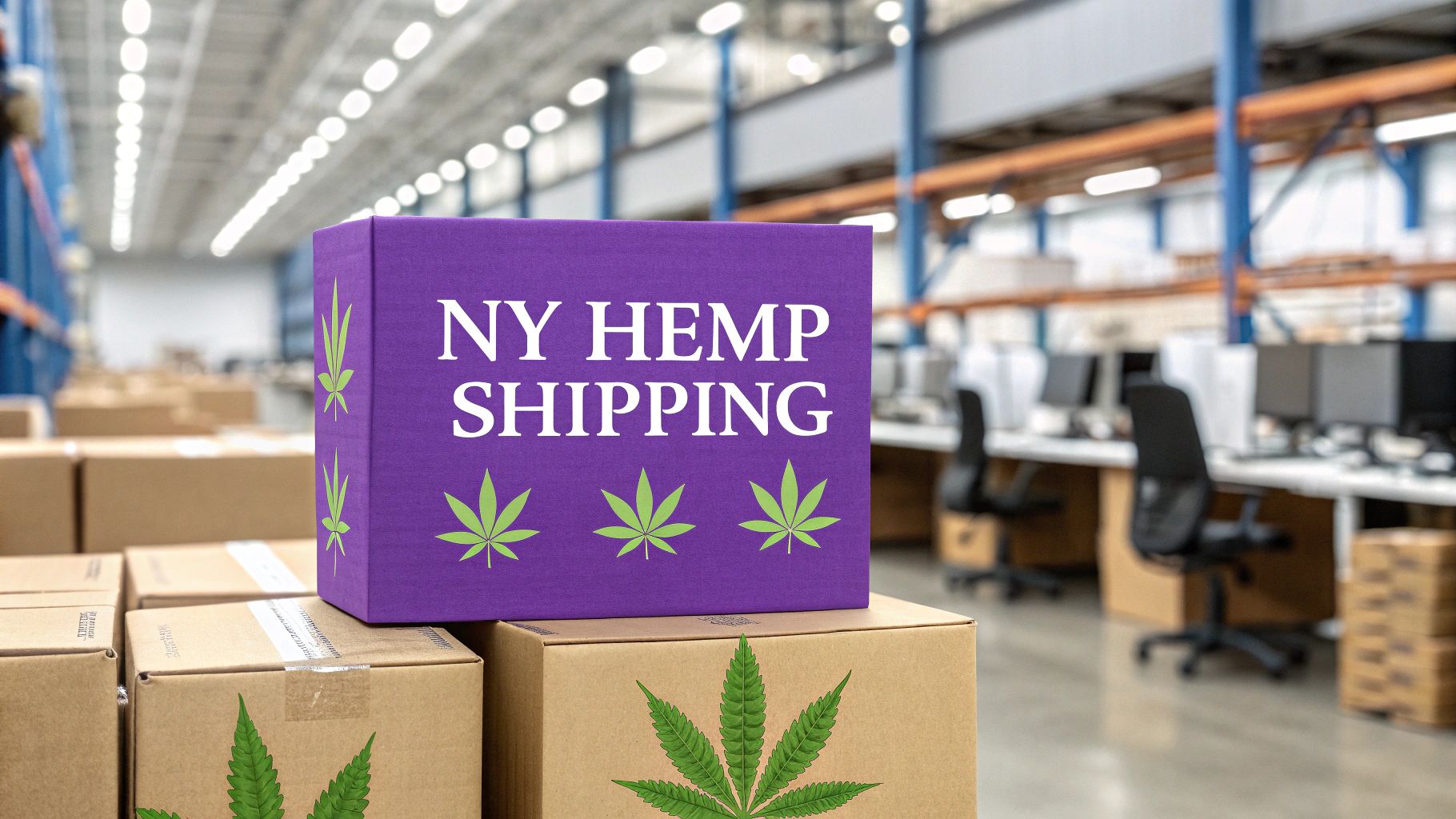
CBD/Hemp/THCA Shipping Laws New York: What You Need to Know
Learn everything about CBD/Hemp/THCA Shipping Laws New York. Stay compliant with the latest rules for edibles, vapes, and more. Read our expert guide!
Cody Y.
Updated on Oct 11, 2025
Shipping hemp-derived products to New York feels less like running a business and more like navigating a minefield. The rules are constantly shifting, making it an incredibly high-stakes market for any e-commerce brand.
The short version? You can generally ship most CBD products, but forget about anything inhalable. Smokable hemp flower and all vape products are strictly prohibited. And THCA flower? That's a dangerous legal gray area you'll want to avoid completely. Get it wrong, and you're looking at seized shipments, hefty fines, or worse.
Your Guide to New York’s Complex Hemp Shipping Rules
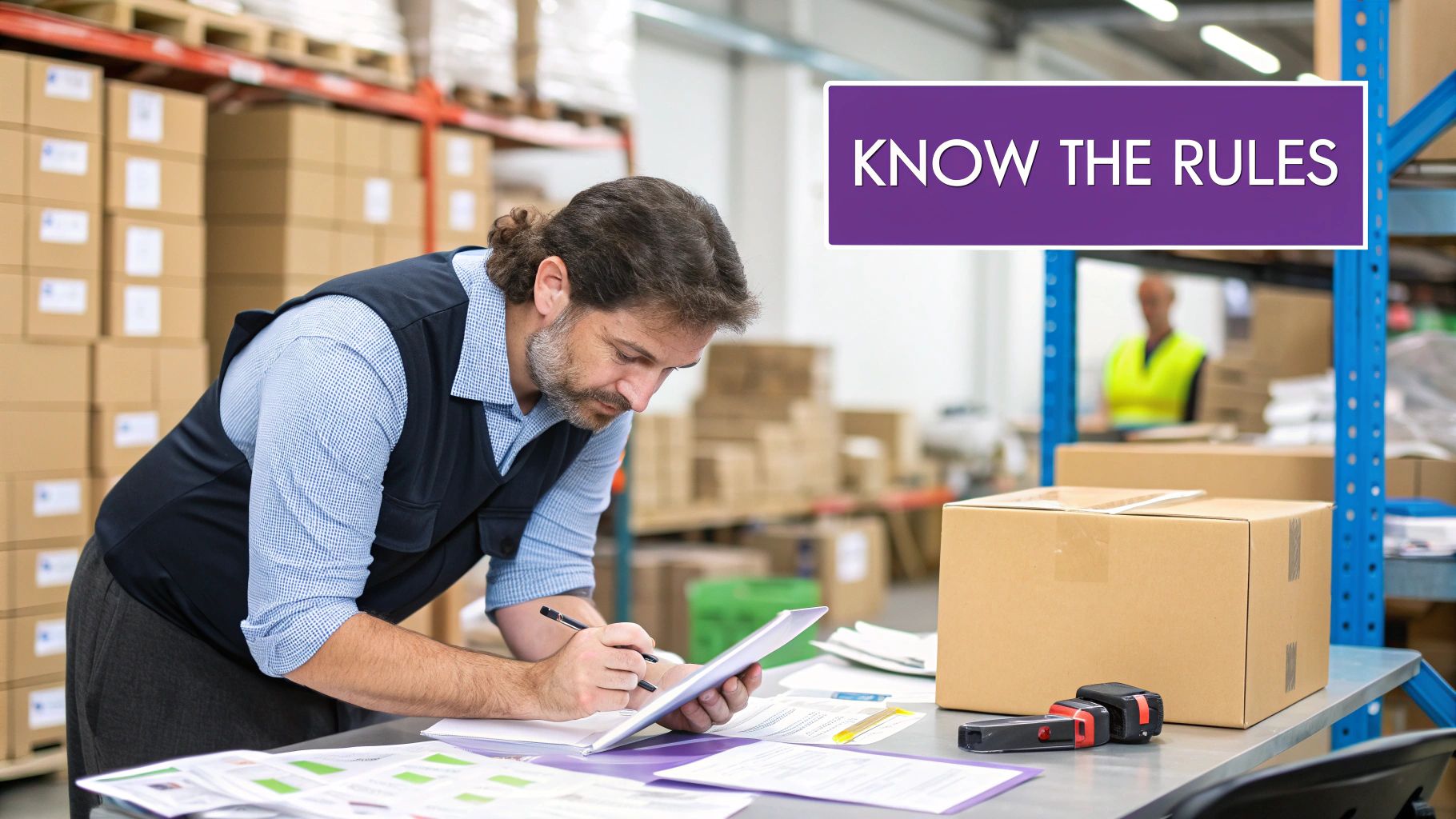
This guide is your map through New York’s tangled web of hemp shipping laws. We'll cut through the legal jargon surrounding CBD, hemp, and THCA, giving you a crystal-clear picture of what's legal to ship and what will land you in hot water. The goal is simple: arm your business with the knowledge to sidestep costly mistakes and turn a huge risk into a manageable part of your operations.
Think of this as the essential briefing you need before tapping into one of the country's most valuable—and complicated—markets. Understanding these rules isn’t just about checking a box for compliance; it's about protecting your business and making sure your packages actually get where they're going.
What This Guide Covers
We’re going to break down the key state and federal laws that shape New York’s regulatory landscape. You'll get a practical understanding of why some products face an iron wall of restrictions while others can be shipped with relative ease. We'll build your knowledge from the ground up, starting with the basics before getting into the nitty-gritty of specific products.
This guide will specifically help you:
- Understand Key Laws: We’ll explain the 2018 Farm Bill and New York's cannabis laws in plain English.
- Identify Prohibited Products: You'll know exactly which items, like smokable flower and vapes, are off-limits for shipping into the state.
- Navigate the THCA Gray Area: We’ll clarify why shipping THCA flower to New York is an exceptionally bad idea for online sellers.
- Automate for Safety: Discover how to use tools to enforce these rules automatically at checkout, protecting your business from human error.
New York is just one piece of the puzzle. Navigating the web of shipping laws by state can be a huge challenge for any online hemp retailer. For a broader look at nationwide regulations, check out our complete 2025 compliance guide on CBD shipping laws by state.
By the end of this article, you won't just know the rules—you'll have a clear strategy for putting them into action. This proactive approach turns compliance from a headache into a real competitive advantage, letting you serve the massive New York market with confidence.
The Legal Foundation for Hemp Products in New York
To make sense of New York's specific shipping rules, we first have to understand the legal ground they're built on. It's like learning the basic rules of a sport before trying to decipher complex plays. The entire modern hemp industry really stands on two pillars: one landmark federal law and one set of state-specific regulations.
At the federal level, the 2018 Farm Bill was the big bang for the hemp industry. Before this law, all cannabis plants, including hemp, were lumped together as illegal controlled substances. The Farm Bill blew that up by creating a critical legal distinction between two types of cannabis, all based on a single chemical measurement.
Think of it like sorting apples into two baskets based on a specific sugar content. One basket gets labeled "hemp," the other "marijuana."
- Hemp: Legally defined as the cannabis plant (Cannabis sativa L.) and any part of it with a Delta-9 tetrahydrocannabinol (Delta-9 THC) concentration of not more than 0.3% on a dry weight basis. This is the compound that produces the traditional "high."
- Marijuana: Any cannabis plant that goes over that 0.3% Delta-9 THC line.
That one number—0.3%—is the bright line that separates federally legal hemp from federally illegal marijuana. This bill kicked the door open for the nationwide cultivation, sale, and shipment of hemp products like CBD oil, topicals, and edibles.
New York’s Own Rulebook
While the Farm Bill set the national stage, New York State decided to write its own script. The state created the Office of Cannabis Management (OCM) to oversee every cannabis and hemp-related activity. The OCM is the official referee, making sure everyone in the industry plays by New York’s specific rules. Before getting into the weeds on shipping, it's smart to have a solid grasp of the general legal requirements for starting a business in New York City.
New York's approach has been shaped by its own legislation. For example, the passage of Senate Bill S6184A in 2019 was a huge step in formalizing the state's hemp program. This law built a clear framework requiring lab results, transparent labeling, and even mandated that all CBD products include a QR code linking directly to their lab reports—a move that definitely builds consumer trust. It also initially prioritized local farms by mandating that CBD beverages use only New York-grown hemp.
The Concept of Total THC
One of the most critical concepts to get right, especially when we're talking about THCA, is the idea of "total THC." New York, like many other states, has started looking beyond just the Delta-9 THC content in a raw product. They're now considering the potential THC that can be created when the product is heated.
This is where compounds like Tetrahydrocannabinolic acid (THCA) enter the picture. THCA is non-intoxicating in its natural state, but it converts into psychoactive Delta-9 THC when you heat it up, a process called decarboxylation.
Analogy: Think of THCA as raw cookie dough. By itself, it's not a cookie. But it has all the potential to become one the second you put it in the oven. New York regulators are essentially looking at the "potential cookies" in a product, not just the ones that are already baked.
State regulations now use a formula to calculate this potential:
Total THC = Delta-9 THC + (THCA x 0.877)
This calculation gives regulators a snapshot of a product's true intoxicating potential. And that's exactly why shipping high-THCA flower to New York is so risky—regulators don't see it as legal hemp. They see it as potential marijuana hiding in plain sight. Understanding this legal foundation is essential before we dive into the specific shipping restrictions for different products.
Decoding Product-Specific Shipping Restrictions
Getting a handle on the big-picture legal framework is one thing, but the real devil is in the details. In New York, not all hemp-derived products get the same treatment. Think of it like a driver's license: just because you're licensed to drive a car doesn't mean you can hop behind the wheel of a semi-truck. Each product category—edibles, topicals, flower—plays by its own set of rules.
Here, we'll walk through a clear roadmap for the most common products you're likely selling. We'll break down the crucial differences that decide whether an order can legally land on a New York doorstep. This isn't just about best practices; it's about keeping your packages from getting seized and staying on the right side of the law.
Edibles and Topicals: The Green Light Categories
For the most part, CBD edibles and topicals get the green light for shipping into New York. This covers all the popular stuff: CBD gummies, tinctures, lotions, and balms. As long as they come from federally compliant hemp (meaning they contain less than 0.3% Delta-9 THC), you're generally in the clear.
But "allowed" doesn't mean unregulated. New York's Office of Cannabis Management (OCM) has strict requirements for labeling and testing. Your products need clear labels showing cannabinoid content and must include a QR code linking straight to a third-party lab's Certificate of Analysis (COA). That level of transparency is non-negotiable.
This decision tree gives you a quick visual breakdown of what's allowed versus what's prohibited for shipping into New York.
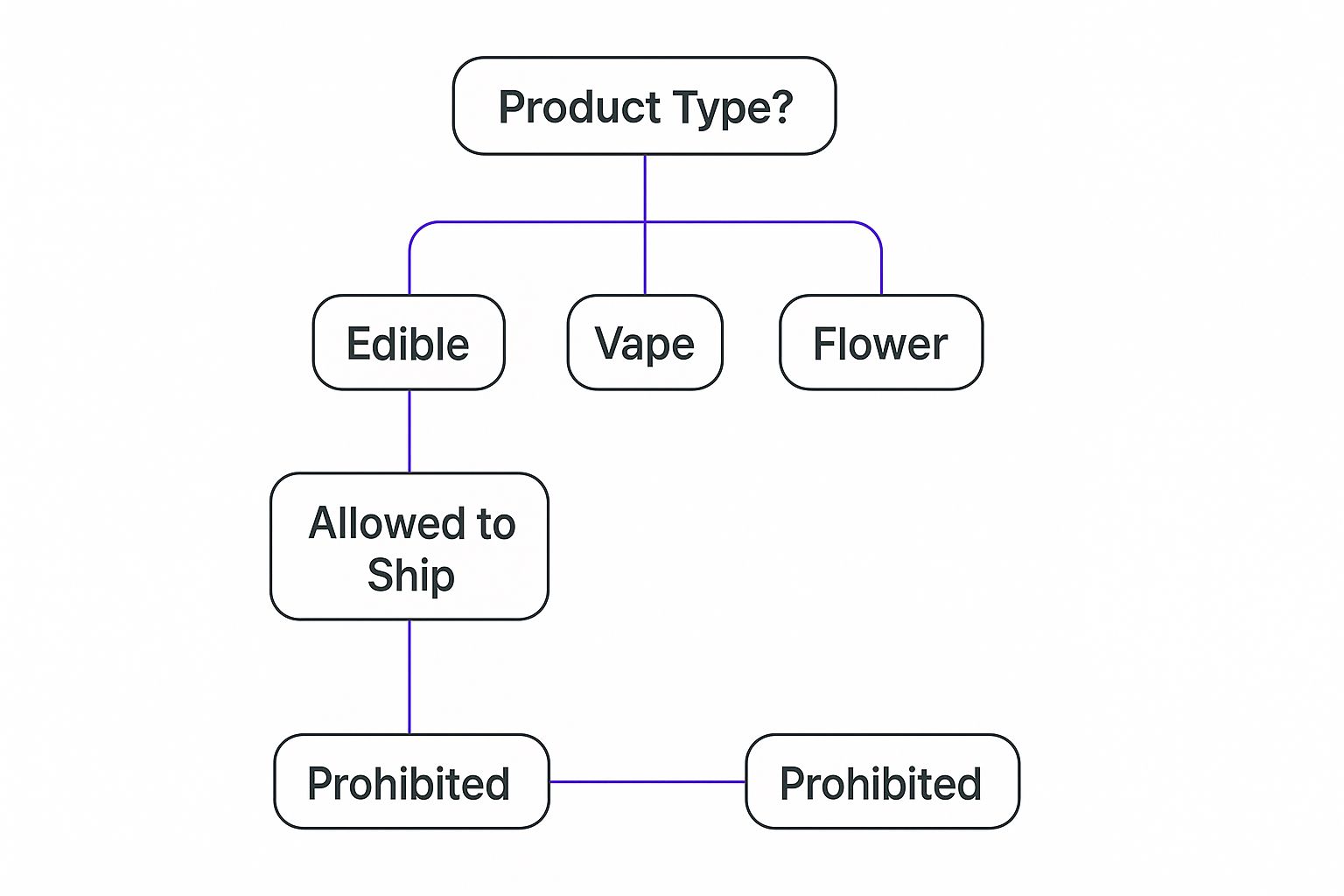
As you can see, while things you eat or put on your skin are mostly fine, anything inhalable like vapes and flower is a hard no.
Smokable Hemp Flower: A Clear Prohibition
This is where the rules get ironclad. New York State flat-out prohibits the sale and shipment of smokable hemp flower to consumers. This ban is a critical piece of the state's regulatory puzzle, designed to stop any confusion between legal hemp and illegal marijuana.
From a regulator's point of view, a bag of high-CBD hemp flower looks, smells, and feels exactly like a bag of high-THC marijuana. Banning all smokable flower shipments is a simple way for law enforcement to crack down on the illicit market without having to run lab tests on every package they find suspicious.
The bottom line is simple: if it's raw hemp flower meant for smoking, you cannot legally ship it to a customer in New York. Trying to do so is a direct violation of state law and one of the fastest ways to get your shipments intercepted.
This is a perfect example of why you need specific shipping rules, not just a blanket "hemp is legal" policy. You have to block only the products that are actually banned. For a wider view, our guide on general hemp shipping rules and restrictions provides essential context on nationwide laws.
The PACT Act and The Ban on Vape Products
The situation with vape products is even messier, thanks to a restrictive federal law that clamps down on the entire category. Shipping any vape product is effectively prohibited, whether it has CBD, THCA, or no active ingredients at all.
This all comes down to the federal Prevent All Cigarette Trafficking (PACT) Act. This law was updated in 2021 to include all "electronic nicotine delivery systems" (ENDS), and the definition was written so broadly that it swept up all hemp and CBD vaporizers, too. As of October 2021, the United States Postal Service (USPS) is prohibited from shipping these products directly to consumers.
Major private carriers like FedEx and UPS weren't far behind. They quickly rolled out their own policies banning consumer vape shipments, leaving online retailers with basically zero compliant shipping options. For your business, this means any product you sell that's a vape cart, disposable pen, or e-liquid must be blocked from shipment to any address in New York.
Navigating the Legal Gray Area of THCA
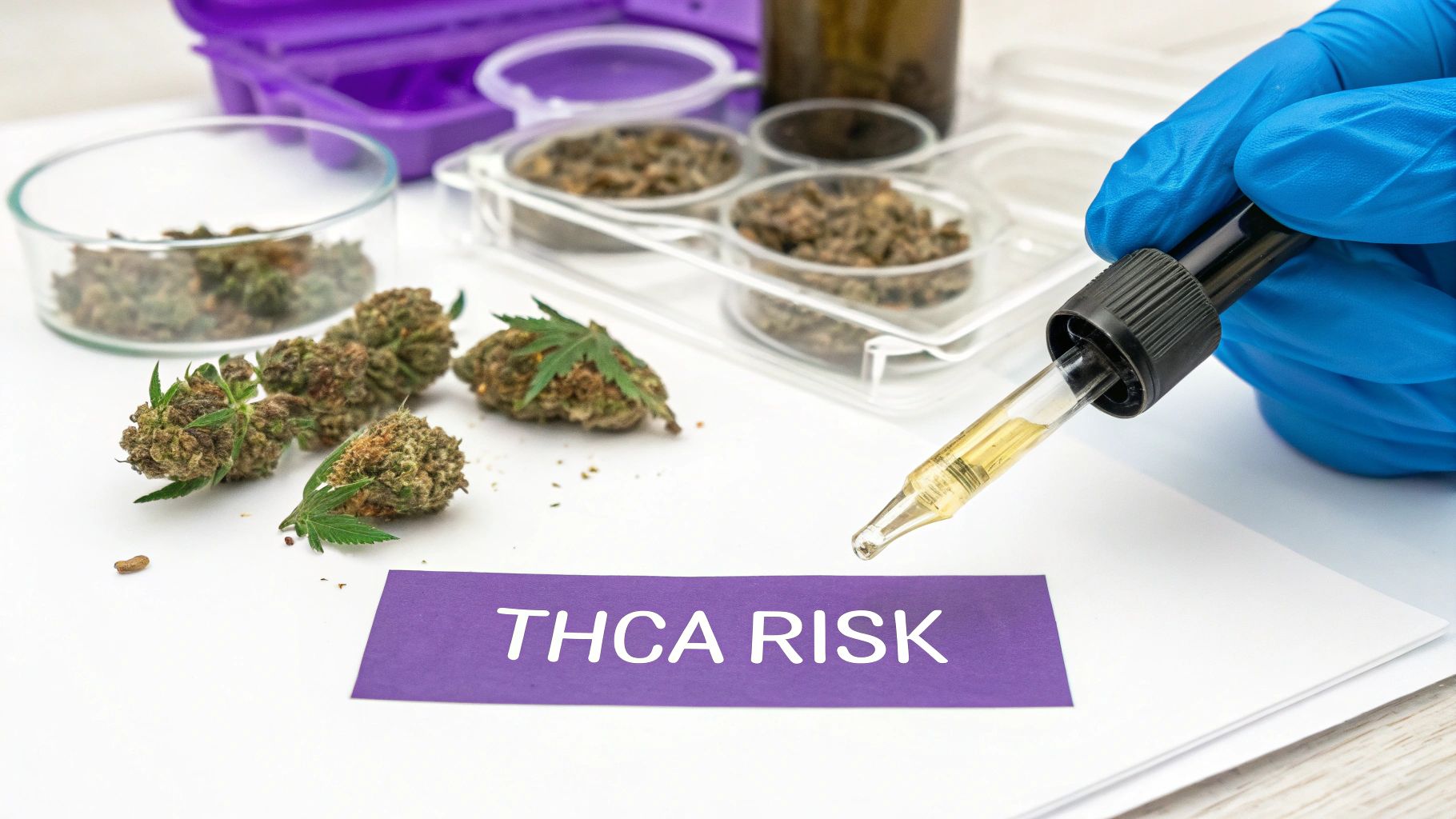
While the rules for CBD edibles are pretty clear and smokable flower is a definite no-go, we’re now wading into the murkiest—and riskiest—part of the hemp market: Tetrahydrocannabinolic acid (THCA). At first glance, THCA products might look like they're federally compliant. But shipping them to New York? That’s playing with fire.
THCA is a non-intoxicating compound found naturally in raw cannabis plants. The whole legal argument for selling it hinges on a simple fact: in its raw state, a high-THCA product often has a Delta-9 THC level below the federal 0.3% threshold. This entire argument, however, goes up in smoke the moment you add a little heat.
When you smoke, vape, or cook THCA, a process called decarboxylation kicks in, converting it directly into intoxicating Delta-9 THC. This simple chemical reaction is precisely why THCA products have become so popular—and it’s also what makes them a massive compliance headache for any online seller.
The Total THC Test Changes Everything
New York regulators aren't fooled by the low Delta-9 THC content on the label. They’re looking at a much bigger picture using a metric called "total THC." This calculation considers the potential intoxicating power of a product by adding the existing Delta-9 THC to the amount that could be created from its THCA.
Analogy: Think of THCA as a gift card for THC. Your product might have only $0.30 in cash (0.3% Delta-9 THC), but it’s holding a $20 gift card (THCA) that turns into cash the instant it's "activated" with heat. Regulators in New York care about the total potential value—the $20.30—not just the loose change.
This approach slams the door on what some sellers see as a legal loophole. From a regulatory perspective, a product with 20% THCA and 0.2% Delta-9 THC isn't a compliant hemp product; it's just marijuana waiting to happen.
Why Shipping THCA to New York Is a Bad Idea
Trying to ship high-THCA products into New York puts your business in serious jeopardy. State agencies, led by the Office of Cannabis Management (OCM), are cracking down hard on products they believe are designed to sidestep the law. Here’s what you’re risking:
- Product Seizures: Shipments flagged as high-THCA can be intercepted and confiscated. That’s a total loss of your inventory and revenue.
- Legal Penalties: If the state decides you're selling unregulated marijuana, you could face massive fines and legal action against your company.
- Reputational Damage: Getting caught for non-compliance can wreck your brand's reputation and get your accounts terminated by payment processors and shipping carriers.
The New York cannabis market is exploding, with projections to hit $6 billion by 2027 and over $1.3 billion in 2025 alone. With that kind of growth comes intense regulatory scrutiny. Officials are laser-focused on enforcement, particularly on out-of-state products and sketchy labeling. You can get a deeper dive into the state of New York's cannabis industry on Distru.com.
Bottom line: while THCA might exist in a legal gray zone nationally, the direction of CBD/Hemp/THCA shipping laws in New York is crystal clear. The state's focus on total THC means these products are treated as non-compliant marijuana, making them far too risky to ship.
How to Automate Shipping Compliance in WooCommerce
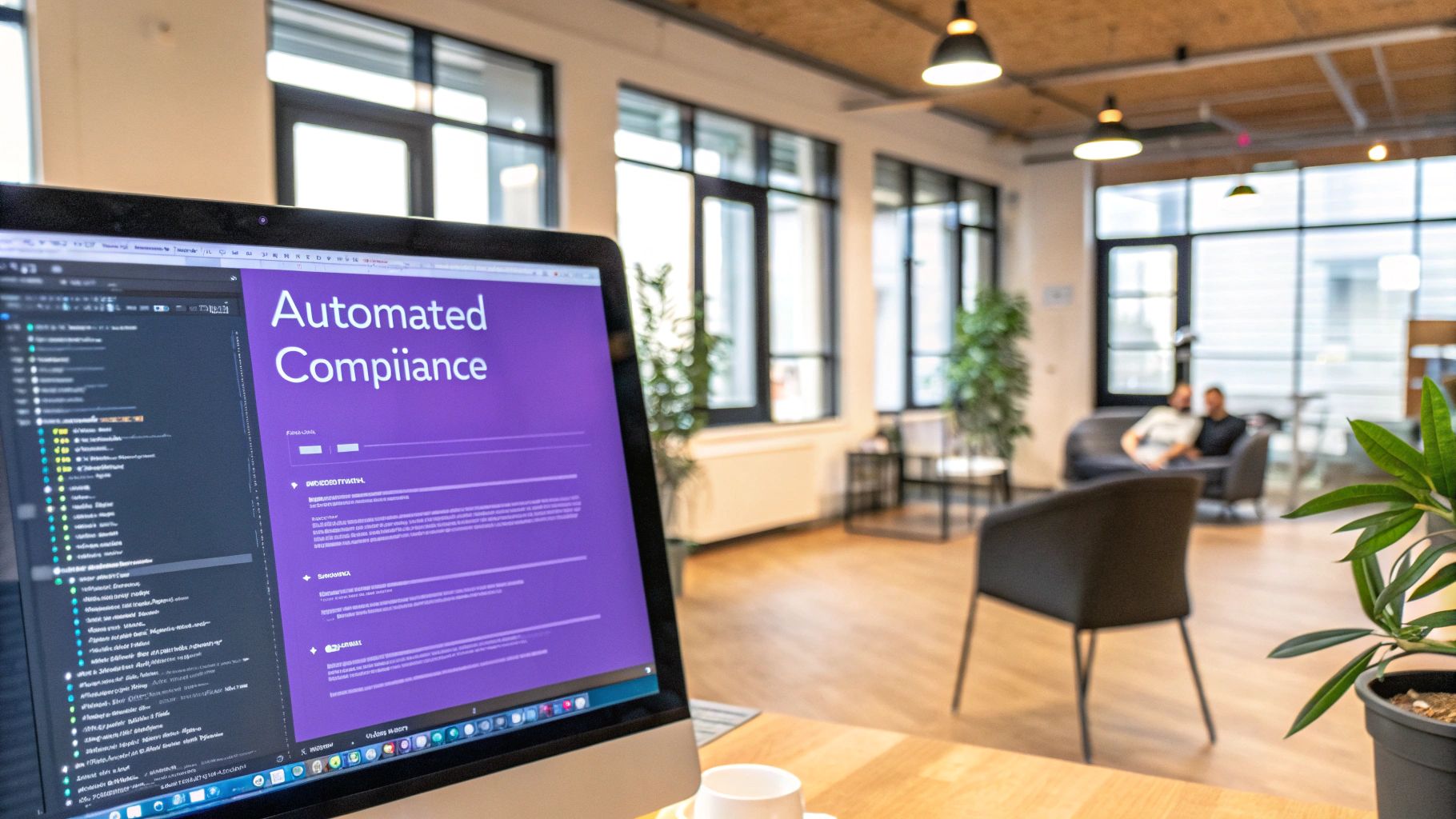
Knowing the tangled mess of CBD, hemp, and THCA shipping laws in New York is only half the battle. The real fight is enforcing those rules on every single order, day in and day out, without fail.
Relying on your team to manually check every order is a recipe for disaster. One tired employee or a hectic Monday morning is all it takes for a costly mistake to slip through, putting your entire business on the line.
This is where automation becomes your best friend. Instead of trusting human memory, you build a digital safeguard that works 24/7. For anyone running on WooCommerce, a plugin like Ship Restrict can turn your compliance headaches into a set-it-and-forget-it system.
Why Manual Compliance Fails
Think of your checkout process as a security checkpoint. A manual system is like a guard trying to memorize a long, complicated list of rules that keeps changing. Can they block vapes going to New York but allow them for Nevada? Did they remember that THCA flower is also a no-go for New York addresses? Eventually, something is going to get missed.
This approach is just asking for trouble:
- Human Error: A simple oversight leads to shipping a banned item, which means seized packages, furious customers, and potential fines.
- Inconsistency: Different team members might interpret the rules differently, creating a chaotic and unreliable shipping process.
- It Doesn't Scale: As you grow, manual checks become a massive bottleneck. Fulfillment slows down, and the chances of a mistake skyrocket.
Automation replaces that flawed human guard with a perfect, automated gate. It checks every order against your rules in a split second, guaranteeing nothing prohibited ever gets past checkout.
Setting Up Your First Rule in Ship Restrict
Let’s walk through a real-world example to see how you can protect your business. We know New York has banned all vape products. Using Ship Restrict, we can create a simple but bulletproof rule to enforce this ban automatically.
The process is incredibly straightforward. You create a new rule that tells your store: "IF a customer's shipping address is in New York AND their cart contains a product from the 'Vapes' category, THEN block the shipment."
It’s that simple. Here’s what it looks like inside the plugin:

The interface makes it easy to define the conditions—the location (New York) and the product category (Vapes)—that trigger the restriction.
Once that rule is active, you’re done. Any customer who tries to check out with a New York address and a vape in their cart will be politely stopped. They’ll see a custom message explaining why they can't proceed, and the illegal order is never placed. You’re protected before a problem can even start.
Key Takeaway: The power here is precision. You aren't blocking all sales to New York—just the ones with prohibited items. A customer can still buy CBD gummies and have them shipped without a hitch, all in the same system.
Expanding Your Rules for Total Protection
The beauty of an automated system is how easily it adapts. New York's restrictions go beyond just vapes. You also need to block smokable hemp flower and any high-risk THCA products. With Ship Restrict, you can build out a complete compliance framework in minutes.
Here are the essential rules you should create for New York:
- Block the "Vapes" Category: Just like our example, this is your first line of defense against PACT Act violations.
- Block the "Smokable Flower" Category: Create a separate rule targeting any product you’ve categorized as hemp flower to comply with New York's ban on inhalables.
- Block the "THCA Products" Category: Given the state's focus on "total THC," a dedicated rule to block all THCA-dominant products from New York addresses is a must to stay out of legal hot water.
By creating separate rules for each product type, you keep your system clean and organized. If a law changes for just one category, you can update that specific rule in seconds without messing with the others. For more ideas, check out our guide on managing CBD and hemp shipping restrictions in WooCommerce.
Ultimately, automating shipping compliance isn't just a convenience—it's a critical business practice. It minimizes risk, ensures every order is consistent, and lets you operate with confidence in tricky markets like New York. It turns regulatory headaches into a simple, background process, freeing you up to focus on what really matters: growing your business.
Future-Proofing Your Hemp Business
In the fast-moving world of hemp regulations, the only thing you can count on is change. Getting a handle on today's CBD/Hemp/THCA shipping laws in New York is tough enough, but staying compliant tomorrow requires a real, forward-looking strategy. Building a resilient business isn't just about following the rules that exist now; it's about creating a system that can adapt to whatever comes next.
It all boils down to proactive adaptation. Instead of scrambling to react after a new regulation has already caused a problem—like a seized shipment or a frozen payment account—you need to anticipate the shifts. This means making it a regular habit to audit your shipping rules and your product catalog against the latest legal updates.
Staying Ahead of Regulatory Shifts
To stay informed, you need to plug into reliable sources of information. Don't wait for a notice from a shipping carrier to find out a law has changed. Make it a routine to monitor a few key resources for any news that could hit your bottom line.
Here are the sources we keep bookmarked:
- The New York Office of Cannabis Management (OCM): This is ground zero for official announcements, proposed rule changes, and final regulations. If it's official, it's here first.
- Trusted Industry News Outlets: Publications that live and breathe the cannabis and hemp sectors give you the analysis and early warnings you need about legislative trends before they become law.
- Legal Counsel: Honestly, investing in advice from a lawyer who specializes in cannabis law is one of the smartest moves you can make. They can translate the dense legalese and offer guidance that’s specific to your business model.
Beyond just shipping, it's also critical to secure the right financial services. Since many traditional banks still won't touch the industry, you'll need to look into specialized payment gateways for high-risk businesses that are built to handle this market.
The smartest businesses don't just follow the rules—they build a framework that expects the rules to change. Automation is the backbone of that framework, providing a consistent, error-free enforcement of your shipping policies.
Ultimately, future-proofing is about combining vigilance with technology. By staying informed and using automated tools like Ship Restrict, you can build a flexible operation that doesn't break every time Albany passes a new bill. This approach will help your business not just survive in New York’s dynamic market, but actually thrive in it for the long haul.
Still Have Questions? Let's Clear Things Up
Navigating New York's specific rules for CBD, hemp, and THCA can feel like walking through a minefield. Below are straight answers to the questions we hear most often, designed to help you cut through the confusion and ship with confidence.
Can I Legally Ship CBD Gummies To New York?
Yes, for the most part, you can. Shipping non-inhalable products like CBD gummies, tinctures, and topicals to New York is generally fine. The crucial detail is that they must be derived from federally compliant hemp, which means containing less than 0.3% Delta-9 THC.
But that's not all. New York has strict labeling requirements you can't ignore. Your product packaging needs to clearly display the cannabinoid content and include a QR code that links directly to a third-party Certificate of Analysis (COA). It's all about transparency.
Is Shipping THCA Flower To New York A High-Risk Activity?
Absolutely. Shipping THCA flower into New York is one of the riskiest moves an e-commerce business can make right now. While THCA itself isn't intoxicating in its raw state, New York regulators are focused on a concept called "total THC." This calculation considers the potential Delta-9 THC that gets created when the flower is heated.
Because high-THCA flower can easily be classified as illegal marijuana under New York's "total THC" formula, it's one of the most dangerous products to ship. We strongly advise against it to avoid having your packages seized and facing serious legal trouble.
Why Is Shipping CBD Vapes To New York So Difficult?
The biggest hurdle here is a federal law called the PACT Act. Originally for tobacco, this law was expanded to cover all vaporizer products—it doesn't matter if they contain nicotine or not.
This federal rule effectively bans shipping vape products directly to customers through the USPS. Seeing this, major private carriers like FedEx and UPS created similar policies. This leaves you with virtually no compliant way to ship vapes to individual customers in New York, or anywhere else in the United States for that matter.
How Does An Automation Tool Prevent Shipping Mistakes?
Think of a tool like Ship Restrict for WooCommerce as your digital gatekeeper. It completely removes the risk of human error. Instead of asking your fulfillment team to memorize a long, complicated list of rules for every state, you build automated safeguards that work around the clock.
For example, you can set a simple rule: "Block all products in the 'Vapes' and 'THCA Flower' categories from shipping to New York." Once it's set, that rule runs 24/7 on every single order, guaranteeing 100% compliance without anyone having to lift a finger. It's the simplest way to protect your business from accidental, and costly, violations.
Stop gambling with costly shipping errors and protect your business. With Ship Restrict, you can automate your shipping rules for New York and every other state, ensuring every order that leaves your warehouse is compliant. Get Ship Restrict today and start shipping with confidence.

Cody Yurk
Founder and Lead Developer of ShipRestrict, helping e-commerce businesses navigate complex shipping regulations for regulated products. Ecommerce store owner turned developer.